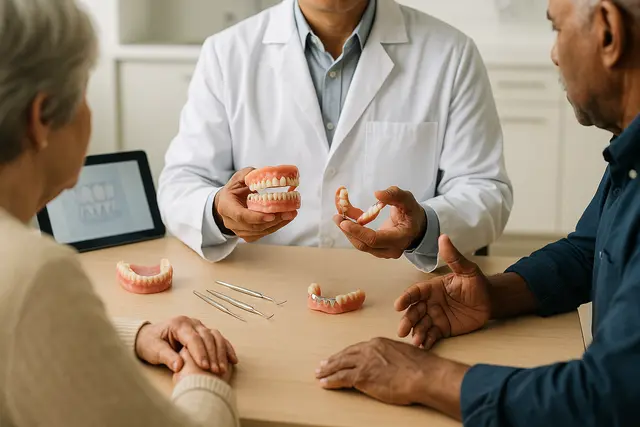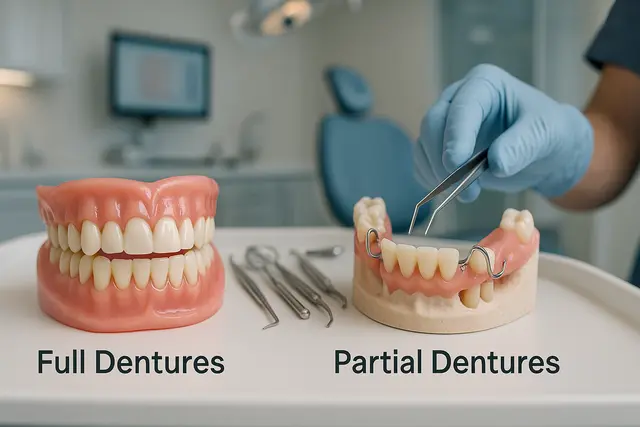Prosthodontics
5 min read
Nov 03, 2025
Dentures vs. Partial Dentures Pros and Cons: Helping You Make the Best Choice
Tooth loss can impact everything from your self-confidence to your ability to enjoy your favorite foods. Fortunately, modern dentistry offers practical solutions that restore both function and aesthetics. Two of the most common options are full dentures and partial dentures, each with its own advantages and limitations.

When you’re dealing with tooth loss, the idea of smiling or chewing confidently again might feel far away. Whether you’ve lost one tooth or an entire arch, the good news is there are real solutions that work. One of the most common choices patients face is deciding between full dentures and partial dentures. But how do you know which one is right for you?
Let’s walk through the pros and cons of each option, the benefits of full dentures versus partials, and how to make a decision that fits your smile, lifestyle, and budget.
Understanding the Denture Difference
A denture is a removable dental appliance designed to replace missing teeth. There are several types of dentures available, but they all aim to do one thing: give you back your ability to eat, speak, and smile comfortably.
Dentures differ based on how many teeth they replace and how they stay in place. Some cover an entire arch of missing teeth, while others work with your remaining natural teeth. They can be removable or fixed, made with various materials, and fitted for your upper or lower jaw.
So let’s break it down a bit more.
Full Dentures Explained
Full dentures are used when you’re missing all your teeth in your upper or lower jaw. These are also called complete dentures, and they rest directly on the gum tissue and the lower jawbone ridge for support.
Full dentures can take some time to get used to. Your dentist may provide an immediate denture right after extractions, so you’re never without teeth. But the final set usually comes after your gums have healed.
Pros of Full Dentures:
Cost-effective for those missing all their teeth
Restores full arches in one appliance
Non-invasive, no surgery required
Full dentures can be removed for cleaning
Cons of Full Dentures:
Can take time to adjust to
May feel less stable without adhesive
Doesn’t offer the same bite strength as natural teeth or dental implants
Full dentures can take time to get fitted properly
They rely on suction, or sometimes you need to use denture adhesive for extra grip.
What Is a Partial Denture
A partial denture replaces one or more missing teeth when you still have some healthy natural teeth left. They clip or clasp onto your existing teeth for support, keeping everything stable.
Partial dentures may come with metal clasps or gum-colored bases to help them blend in. Some types of partials are made with flexible materials for comfort, while others are more rigid for durability.
Pros of Partial Dentures:
Uses existing teeth for support
Helps prevent remaining teeth from shifting
Often more comfortable and stable than full dentures
Easier to adapt to for many patients
Cons of Partial Dentures:
Also require adjustment time
Metal clasps may be visible
Not suitable if most teeth are missing
Whether full or partial dentures, it’s crucial to weigh how many teeth need replacing, the health of your existing teeth, and how comfortable you want to feel day to day.
Choosing Between Full or Partial Dentures
If you’re missing all your teeth in one arch, full dentures are likely the best fit. But if you still have some strong, healthy teeth left, partial dentures can help you keep them while replacing what’s missing.
The full vs partial decision often depends on:
Number of teeth missing
Strength and health of your remaining natural teeth
Your jaw and gum condition
Budget and long-term dental goals
Dentures are made to fit your mouth, but they require maintenance. You’ll also want to factor in how dentures feel to wear, speak with, and eat with. Sometimes, partial dentures can help you adjust more easily than going straight into a full set.
When to Consider Implant-Supported Dentures
If you’re looking for a stronger, more permanent feel, implant-supported dentures might be your answer. These combine dental implants with dentures, giving you a more stable, long-lasting solution.
Advantages of Implant-Supported Dentures:
Stronger bite force
Better bone retention in the jaw
No slipping or denture adhesive needed
Snap-in dentures are a popular version of implant-supported dentures for added stability and ease of use.
Denture Care Tips That Actually Work
Taking care of your dentures is key to keeping your mouth healthy and your appliance in good shape. Here are a few practical denture care tips:
Clean your dentures daily with a soft brush
Soak them overnight in a special cleaner or water
Rinse after meals to remove food particles
Avoid hot water that can warp the denture
Brush your gums, tongue, and any natural teeth to support good oral health
Proper care helps prevent gum irritation, bad breath, and oral infections. It also extends the life of your denture.
Full vs Partial Dentures: What’s Best for You
Choosing between full and partial dentures depends on your individual needs. If you’re missing all the teeth in the upper or lower jaw, a full denture makes sense. But if you still have some natural teeth, partial dentures replace one or more teeth while preserving what’s still healthy.
The full dentures vs partial dentures decision isn’t one-size-fits-all. You might even transition from a partial to a complete denture over time, depending on how your dental health changes.
Considering Getting Dentures? Let’s Talk Tooth Health
Whether full or partial, dentures offer a reliable solution for missing teeth. Teeth can significantly impact your confidence, your ability to chew, and your overall oral health. Losing teeth doesn’t mean losing your quality of life.
Dentures help support your jaw, restore your bite, and fill gaps left by missing teeth. Full or partial dentures depends on how many teeth you’ve lost and the condition of the ones you still have.
Some patients worry that removable dentures won’t feel natural. And yes, there is an adjustment period. But with the right fit, a caring dentist, and a little patience, new dentures can change your life.
What Is the Difference Between Full Dentures and Partial Dentures?
Full dentures replace an entire arch of missing teeth and rest directly on the gums, while partial dentures replace one or several missing teeth and attach to your remaining natural teeth for support. Full dentures are used when all teeth in a jaw are gone, whereas partial dentures are recommended when you still have healthy teeth that can help anchor the appliance.
When Should I Choose Full Dentures Instead of Partial Dentures?
Full dentures are ideal when you are missing all teeth in the upper or lower arch or when remaining teeth are not healthy enough to support a partial denture. They provide a cost-effective way to restore a full smile without surgery. If you still have strong natural teeth, partial dentures are typically a better choice to preserve them and prevent shifting.
What Are the Main Pros and Cons of Partial Dentures?
Partial dentures offer strong support by attaching to natural teeth, help prevent shifting, and are often easier to adapt to than full dentures. However, they still require an adjustment period and may show metal clasps depending on their design. They are not ideal if most teeth are missing or severely weakened.
Are There More Stable Alternatives to Traditional Dentures?
Yes. Implant-supported dentures offer significantly more stability, comfort, and chewing power than traditional dentures. These attach to dental implants placed in the jawbone, reducing movement and improving function. Snap-in options provide secure support without adhesives, but they do come at a higher initial cost and require good jawbone health.
Read Next
Related Posts

Prosthodontics
Differences Between Zirconia and Acrylic Dentures: Benefits, Drawbacks, and Tips
Choosing between zirconia and acrylic for dental implants can feel overwhelming, especially when both materials offer unique advantages. This guide breaks down the essential differences, benefits, and limitations of each option to help you make a more confident, informed decision about your dental restoration journey.
5 min read
Nov 03, 2025

Prosthodontics
Partial Dentures vs. Full Dentures Comparison: What Works Best for Your Situation
Choosing between partial and full dentures is an important step in restoring both your smile and confidence. With each option designed to meet different dental needs, understanding their differences can help you make the right decision for your oral health and lifestyle.
5 min read
Nov 03, 2025

Prosthodontics
Full Dentures vs. Partials: Key Differences, Appearance, and Performance Compared
Choosing the right type of dentures can feel overwhelming, especially if you're unsure whether full or partial dentures are better suited for your needs. Understanding the differences between these two options is key to restoring your smile, comfort, and confidence. This article explores how full and partial dentures compare in terms of appearance, function, and overall fit.
6 min read
Nov 03, 2025
Don’t have time to research every dentist around you?
See why 30k+ patients trusted us